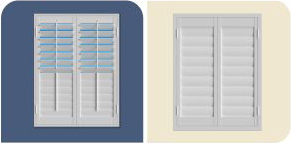
Plantation Shutter Myths: The Truth
Our San Antonio shutter team has busted a few shutter myths in the past. During our previous myth-debunking binge, we exposed some of the most common misunderstandings people have about plantation shutters in San Antonio.
This time, the Sunburst Shutters San Antonio pros are back to set the record straight on a few more myths we’ve been hearing from shutter-buyers in and around Texas. Let’s jump right in.
Myth #1: “Plantation Shutters Only Look Good In Southern Houses.”
When some people hear the term “plantation shutters,” they stick to the image of a giant, sprawling southern mansion surrounded by hills. Although it’s true that they are named for that particular place and time, plantation shutters in fact had huge popularity much earlier and much later than 19th Century Southern America.

Nevertheless, plantation shutters offer those exact same features to any style of home. Craftsman style homes can utilize shutters, just like Colonial homes, Mid-Century Modern houses, and even lake houses can.
Myth: “My Home Style Won’t Work With Shutters Is Too Distinct For Shutters.”
Because plantation shutters have been so popular for so long, some people might think that shutters can seem somewhat boring. We’ve worked with a customer previously who claimed that their house was “too eclectic” to use shutters, which was a big head-scratcher–since shutters are probably the only window treatment that can complement any style.

Myth: “Blinds And Shutters Are Basically The Same Thing.”
For some reason, there’s a lot of confusion over the difference between blinds and shutters. Maybe it has to do with people confusing “louvers” and “slats,” or it’s the similarity in shape that causes the confusion. No matter the reason, shutters and blinds couldn’t be more different. Below is a basic breakdown of the battle between shutters and blinds.
| What’s the difference? | Blinds | Shutters |
| Can block out whole window134 | No | Yes |
| Structure | Dangles from cord | Solid frame attached to window frame |
| Lifespan | Usually wear down or deteriorate after 2-3 years. | Can usually last 20+ years. |
| Permanent or temporary? | Temporary | Permanent |
| Adds to value of the home? | No | Yes |
| Energy Efficiency | Minimal | Can block up to 50% of heat from the sun. |
| Can they fit specialty windows? | Can only fit rectangular windows. | Yes. |
| What are the adjustable parts called? | Slats | Louvers |
Myth: “All window coverings are about the same in energy efficiency.”
Like the “Blinds vs. Shutters” table illustrated, window treatments can vary by a wide margin on how energy efficient they are. The shape, material, and construction can all play a huge part in how energy efficient a window treatment can be.
At the bottom rung of energy efficiency is leaving your window completely bare. Offering just a little more energy efficiency are your common retail aluminum blinds. Up a little further on the spectrum are draperies and heavier fabric window coverings. Getting into somewhat noticeable territory are most wood shutters and honeycomb shades, made to offer UV protection and heat reduction. But at the very top of the mountain are Polywood plantation shutters, designed to both reflect and block thermal heat from passing into your home.
No More Shutter Myths
If you feel like you’re swimming in a sea of half truths regarding window treatments, we can toss you a lifeline. Call Sunburst Shutters San Antonio today at 210-876-0377 to speak to one of our experts and set up a complimentary in-home consultation to find your perfect shutter or window treatment today.


